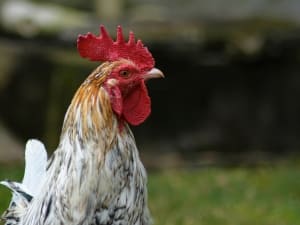
If you’ve ever had a seizure, or ever watched someone have a seizure, you’d know how terrifying it can be, especially if you don’t know what to do to help yourself or the other person.
Chickens can suffer seizures just as humans can. This article explores everything you need to know when it comes to chickens having seizures.
Table of Contents
Chicken seizure:
The health of your bird is of the utmost importance, seizures in birds are very odd and point to something being wrong with the bird.
What causes chicken seizures?
Just as with human seizures a variety of things can cause seizures in chickens. Seizing in chickens isn’t usually environmental (although it can be), there is usually an underlying reason why a chicken will have a seizure.
The reasons behind a chicken seizing can be a spontaneous disturbance in the bird’s brain’s electrical activity, exposure to toxins, viral diseases, fungal diseases, metabolic disorders, tumors, heatstroke, physical injury, infections, poisoning, reproductive problems, nutritional imbalances, and trauma
These seizure episodes can be mild or severe and they can happen frequently.
Chicken seizure symptoms:
Human seizures cause humans to jerk their arms and legs, stiffen their bodies, and cause people to stare into the distance. Here are signs that your chicken is having a seizure:
- Falling off of the perch
- Muscle spasms
- A loss of consciousness
- Unable to control the muscles
- Disorientation
- Wing flapping
- Inability to perch
- Twitching
Different stages of bird seizures:
A bird seizure is made up of 3 stages, these stages being:
Stage 1: A chicken who is having a seizure will start off showing abnormal behaviors, this is called the aural phase
Stage 2: This is the stage where birds start to show more dramatic seizure behavior, the birds will fall off of their perch, start to stiffen their muscles, defecate abnormally or vocalize at random. This is called the ictus phase
Stage 3: This is the stage where birds will show signs of exhaustion, confusion, and lethargy, the bird may also be agitated at this stage. This is called the postictal phase.
What to do:
The best thing you can do for a chicken suffering from a seizure is to get the bird to a vet as soon as you can, getting the bird to an avian vet is recommended but you can also take the bird to a general vet.
Take note of how long the seizure happened also note any behaviors that your bird showed while seizing. Taking a video of your chicken while it’s seizing will also help. Give all this information to your vet.
The vet will physically examine and run tests on the bird and try to find the reason why your chicken is seizing. These tests will likely include blood tests and radiographs. The vet will treat the bird according to what the cause of the seizures is.
Treatments that the vet may give your bird include supplements, modifying your bird’s diet, treating the underlying disease that may be causing the seizure, or giving the bird antitoxins, antibiotics, antivirals, or antiparasitic medications.
If you can’t immediately get the bird to the vet you’d need to relocate the bird.
Relocate the bird and its cage to somewhere stress-free and quiet. Relocate the bird somewhere with dim lighting and make sure that the area is warm but not too hot.
Also, make the bird more comfortable until you can get it to the vet.
Do this by adding a layer of soft padding at the bottom of your bird’s enclosure in case the bird has another seizure and falls.
Make sure that the bird has access to nutritionally dense food while it is recovering after the vet visit and also make sure that the bird has access to enough fresh clean water during this time.
Keep the water in a shallow dish to keep the bird from drowning in the water.
FAQ:
Can baby chickens have seizures?
Yes, baby chicks can have seizures, just as in humans, and in older chickens, baby chickens can develop seizures.
You can help the bird by giving it probiotics, water, making sure that the animal’s vent is not clogged up, and taking her to the vent if you can.
If there is no marked improvement in your bird over some time you may have to put her down.
Do seizures hurt animals?
Seizures don’t seem to hurt animals, and these muscle spasms and abnormal sensations don’t seem to cause your pet any pain, in fact, it seems that animals are widely unaware that the seizures are happening to them.
If you enjoyed this article then you may also be interested in other chicken related articles. Here are some articles that you may be interested in: Chicken Shaking Head And Stretching Neck, Rooster Having Seizures, Crowless Rooster, Rooster Stopped Crowing And Mating, Rooster With A Broken Neck,

